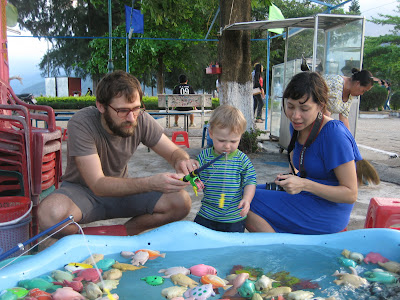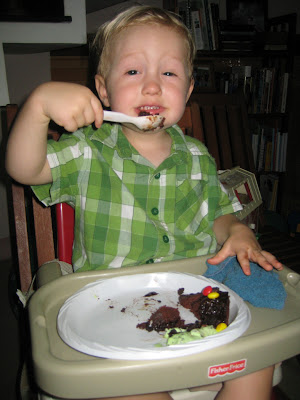Let me begin by saying that Joelle and I come from the
Pacific Northwest, a part of the world that receives only slightly more direct
sunlight each year than the dark side of the moon. When the sun appears in Washington, people
flock to it. We soak it in, knowing that
it might not appear again for weeks or months.
In the long days of summer, when it’s light out until 10:00 (or later)
at night we eat dinner outside, play Frisbee or go for long bike rides at 8:30
at night, delay going to bed until midnight…all so we can catch a few more of
those precious rays. Embedded deep in
the psyche of every true Washingtonian is a simple equation that states: SUN = GOOD.
So it was funny to me at first when I moved to Vietnam and
realized that people here avoid exposure to the sun as assiduously as I might
avoid exposure to, for instance, anthrax or news about Justin Bieber. When class is over and my students are going
home for lunch, they transform from pleasant, casually-dressed college students
into armored, bicycle-mounted UV-battling warriors with nary a millimeter of
skin showing. Jeans and long-sleeve
shirts with sweatshirts over top, gloves that go past their elbows, face masks
that drop all the way down the neck, toe-socks to cover the feet and yet allow
for the wearing of flip-flops, topped off with an umbrella (not for rain but
for sun). We’re talking UV-Protection Level
Midnight.
This has become completely
normal to see over the years and it’s quite understandable. If you’ve ever
spent more than 10 minutes uncovered in the sun here you quickly realize that your
primary goal in life has become finding shade (preferably air-conditioned) and
staying in it until nightfall. Here's a typical beach scene in Quy Nhon between the hours of 8:00 AM and 4:30 PM. Notice: Population zero.
That’s why I laughed in my friend’s face when he mentioned
in passing this morning that today was a special day. A holiday of sorts in which lots and lots of
people go to the beach at high noon to take a dip in the sea and look at the
sun. Those were his words: look at
the sun. At noon. Not only did this sound foolish and potentially
dangerous, it sounded like the least Vietnamese thing imaginable. It was as if once a year everyone just went crazy
for 10 minutes and did the precise opposite of what they were supposed to do. It would have been like the whole population
of Bellingham running up to Canada to go shopping and buy gas at Canadian Costco
for an afternoon. Never happen.
I wasn’t sure I believed him, so at 11:45, forsaking lunch
and my family (for 20 minutes), I grabbed my camera and headed down to the
beach. Sure enough, the world had gone
mad. Quy Nhon is known for looking absolutely
deserted from about 11:00 AM till 3:00 PM.
People who arrive in town for the first time at midday sometimes wonder if the
zombie apocalypse has actually begun. No
one ventures outside if they can possibly avoid it. The old saying from India about “only mad dogs and
Englishmen” going out in the sun rings true here, as the only type of person
you would tend to see on the beach at that hour (other than a fisherman) is the
pasty European kind, punishing their skin because hey, they’re on holiday and
they figure a raging sunburn will make everyone back home jealous. But the
beach today was far from deserted. Kids
and parents, grandmas and college students—up and down Quy Nhon’s 3-mile long
crescent of sand, they were sprinting or hobbling or sauntering out to the
water and splashing around in the glaring hot sun like it was no big
thang.
Hundreds—maybe thousands—of people
were out there, many of them fully clothed, enjoying a little dip, laughing and
playing. There was something wonderfully
childlike about it all, as though some usually strict parents had allowed their
little ones to stay up past their bedtime just
this once.


I even saw a guy waterskiing behind a fishing
boat, it was that nuts. (I’ve never seen
anyone waterskiing in Vietnam, let alone behind a fishing boat.)
The most I’ve been able to find out about this holiday,
named Tết Đoan Ngọ, is that it falls on the 5th day of the 5th
lunar month every year—shortly before the summer solstice. (That, incidentally, would explain why I’ve
never heard of it because we’ve always been back in the States for the summer).
Tradition says that a dip in the sea at
this time is supposed to wash away bad luck and give strength and health for
the time ahead. Like many traditions
that people here might not fully understand themselves, it probably came “from
China.” It’s also interesting in that
the whole dipping-in-the-sea-staring-at-the-sun part of things seems to be
almost entirely localized to Quy Nhon.
When I do an image search for the name of the holiday, the only swimming
pictures I get are of Quy Nhon’s beach. Students
who came to Quy Nhon from other provinces have confirmed that this is something
only "those crazy Quy Nhonese" do.
In any case, I walked along the beach for a bit, enjoying the
atmosphere though not partaking in the actual process of it all. After a while, soaking wet people started
filtering back to their motorbikes or running back to their houses across the
hot sand.
It was a good reminder to me that sometimes life
refreshingly chooses not to fit the mold that we like to put it in. Expectations get turned on their heads, and I
recall that I still have a whole lot to learn about this place and these
people. I also saw it as a kind of cheerfully
defiant act of civil disobedience toward the sun itself, which can start to
feel like a merciless dictator in this season.
Distant echoes, perhaps, of the children of Israel turning their backs and
walking out on Pharaoh (who was, after all, supposed to be the embodiment of
the sun god himself).
I’m willing to bet that an hour after I left, the sun once
again ruled over a desolate beach. I can’t
be certain, though, because by that time I was taking a nap with Micah in a
dim, air-conditioned room and leaving the beach to any mad dogs or stray
Englishmen who happened to be about.





























